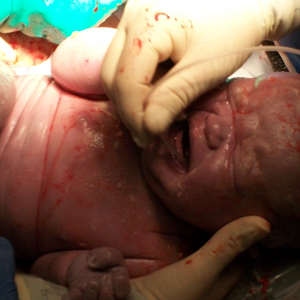
Women are more likely to have urinary incontinence decades after childbirth if they delivered vaginally rather than by caesarean section, a study from Sweden confirms.
Dr Steven Swift, director of urogynaecology and incontinence at the Medical University of South Carolina in Charleston, who did not participate in this research, said he wasn't surprised by the findings.
"Anybody who has ever witnessed a vaginal delivery realises the baby's head is quite large and the muscles that it passes through are not that large. And any time you stretch a muscle there's the potential for damage," he said.
Although some doctors have assumed that vaginal birth puts women at higher risk of incontinence later on, studies haven't focused on the long-term effects of delivery methods.
Incontinence no risk to C-section
Dr Ian Milsom at the Sahlgrenska Academy at Gothenburg University in Sweden and his colleagues collected information on more than 5,200 mothers who had given birth once, between 1985 and 1988. About 1,200 deliveries were via C-section.
When mothers were surveyed roughly 22 years after giving birth, 40% of those who delivered vaginally said they experienced urine leakage, compared to 29% of women who had a C-section.
Dr Milsom said it appears that the last stages of vaginal delivery are most important for later incontinence risk. Women, who began labour with the intention of delivering vaginally, but ended up getting a C-section, were just as likely to report incontinence 20 years later as women who had elective C-section.
The researchers calculated that doctors would have to perform eight or nine C-sections to avoid one case of long-term incontinence. But as bothersome as the problem can be, Dr Milsom said incontinence risk is no reason to perform a C-section.
Not advocating C-section for all
"We're not advocating doing caesarean sections on everybody," he said.
His group found that among women who'd had a C-section; obese women were more than three times as likely to have incontinence as normal-weight women. And obese mothers who'd delivered vaginally were two and a half times as likely to be incontinent as those who were normal weight at the time of the survey.
"This paper shows, most importantly to me, that if you control your weight you're going to do a lot better to control incontinence down the road than if you had a caesarean section over a vaginal delivery," Dr Swift said.
He said one important measure missing from the study was how severe the incontinence was.
Improve incontinence through weight control
"If you ask 100 women, 'Do you leak urine?' a lot of them will say, 'Yes.' The question is, how much does it bother you?" he said.
Dr Milsom's results did show that women who had given birth vaginally were nearly three times as likely to have experienced incontinence for longer than a decade.
The authors of the study write in their report, published March 14th in BJOG: An International Journal of Obstetrics and Gynaecology, that the link between body size and incontinence is encouraging, "as it means that it is never too late to achieve an improvement of (urinary incontinence) through weight reduction and weight control."
(Kerry Grens, Reuters Health, April 2012)




 Publications
Publications
 Partners
Partners














